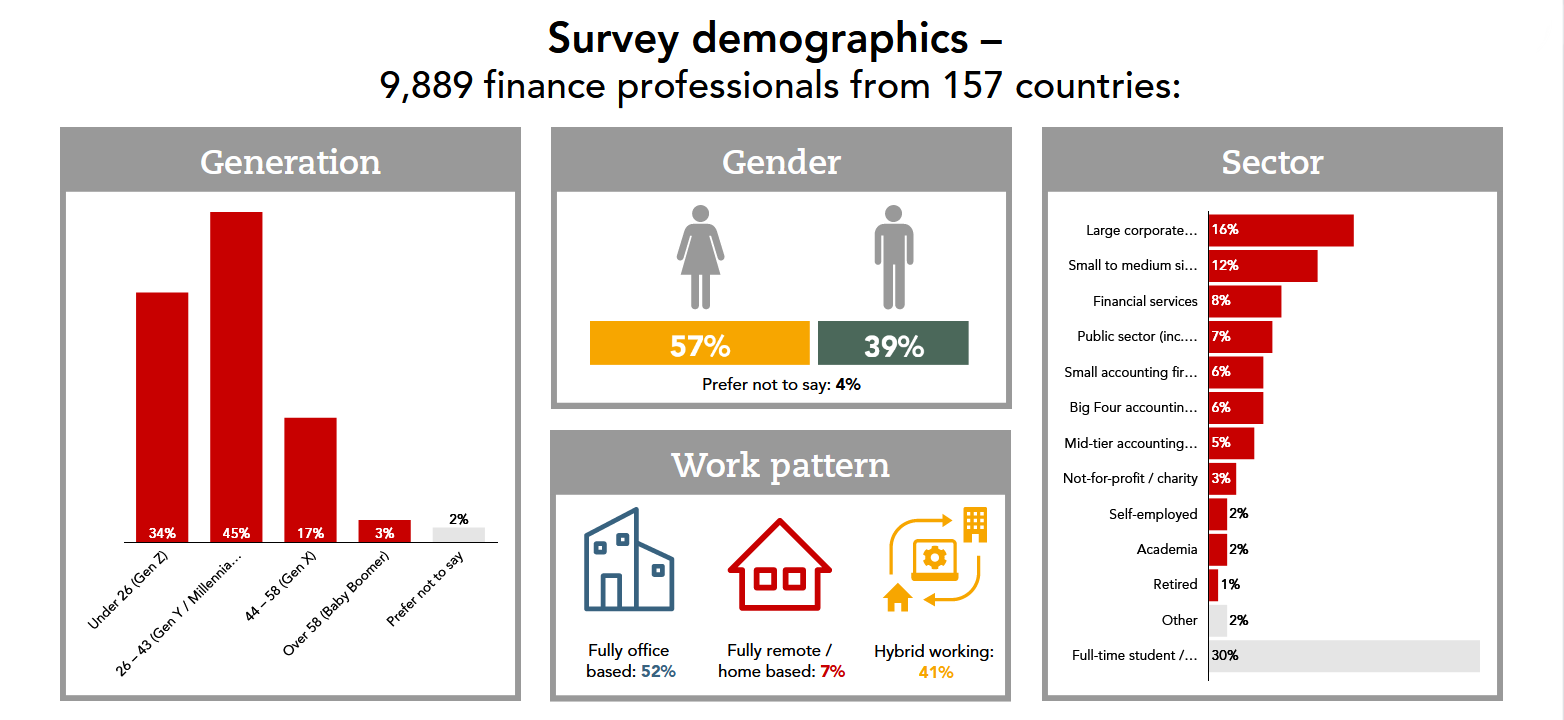Ranging from AI-linked job disruptions to workplace culture and mental health, the six aspects are reshaping professionals’ career aspirations and needs.
In an annual survey of 9,880 professional accountants from 157 countries about how their concerns and aspirations about their work, some trends for the Asia Pacific region (APAC) were noted.
First, a strong focus on integrating AI in finance roles was present. Some 58% of APAC respondents were seeking a pay rise this year, while 50% believed that transitioning to a new organization was necessary to achieve their personal financial goals.
Also, communication, problem-solving, adaptability, and initiative were traits identified in the region’s respondents as core competencies.

Six themes examined
Additionally, the global data trends were grouped into six key themes:
- AI and technology: The accountants and finance professionals voiced concerns about:
- being displaced from entry level roles and having to take a longer path to achieve qualifications and experience
- acquiring more skills to work alongside AI systems and at a high pace of change
- AI transforming many jobs to be more analytical and advisory-focused,
- the over-reliance on AI that could cause privacy, security, bias, ethics and competency issues among workers
- the general uncertainty around when and how AI will impact or disrupt accounting roles
- Cost of living: Inflation was only the fifth-highest-ranked concern in APAC respondents. However, a “global economic downturn impacting my job opportunities” was the second highest-ranked concern in the export-oriented region.
- Working patterns:
- 73% of respondents agreed to prompts that they needed to spend more time in the office compared to the average employee.
- 47% believed managers needed to develop new skills and behavior patterns so they can manage people more effectively while remote-working
- 47% cited finding team collaboration to be more difficult when working remotely
-
Equity, diversity and inclusivity: Respondents expressed the following issues:
- Biased hiring practices such as nepotism or affinities for certain schools or degrees instead of job-fit and merit
- The need for promotion and advancement opportunities to be made more equitable and auditable
- The presence of potential evaluator biases that may unfairly impact job candidates
- The need to track exclusionary and unconscious biases in managers; to show more empathy to peers facing work challenges
- Addressing toxic work cultures and tribalistic tendencies that cause division among workers and teams
- The need to be accepting of different viewpoints and ideas that challenge ingrained ways of thinking
- Diversity, equity and inclusivity (DEI) initiatives to develop under-represented groups into leadership pipelines, including goal-setting, ally-ship programs and ways to track leaders’ commitment to DEI
- Auditing of how “high visibility projects” are assigned and distributed, in order to avoid the formation of cronyistic “inner circles”
- Considering potential barriers to access that may be excluding certain groups inadvertently, and encouraging equal participation by those whose voices may be less heard
-
Mental health and well-being: The data showed alarming rises in work-related stress, anxiety, and burnout. Poor work-life balance was a common theme, as well as concerns related to the blurring of work and personal lives exacerbated by remote working practices. Also:
- Respondents on hybrid-working arrangements scored better on the mental health indicators
- Also mental health appeared to be a gender agnostic issue, younger respondents were more inclined to indicate poor mental health
- Some respondents suggested that accountancy work environments and workflows were naturally rich with extreme pressures that lead to chronic stress, mental exhaustion, and burnout risk over the long-term.
- There was a perceived lack of empathy from leadership, with some respondents suggesting simple “lip service” was being paid to the issue; there were also concerns over inadequate organizational support structures and workforce planning.
- Some respondents felt expectations around productivity remained unrelenting, against an undercurrent of job uncertainty possibly linked to concerns around the pace of technology change. Yet, respondents’ organizations were establishing more well-being program and interventions. The question was whether these measures were addressing the root causes of the crisis or not.
-
Global mobility: The data suggests an incredibly fluid job market with professional accountants in demand and willing to move quickly to enhance their careers and take new job opportunities. Almost half of respondents expected to move to their next role within 12 months, and two-thirds were expecting so within two years. This high level of career aspiration and mobility creates a significant retention challenge for employers. Factors behind job shifts included
- Sector purpose — being able to make a bigger difference to society
- Improved career opportunities
- Improved recognition as an employee
- Reduced pressure/stress in a job role
- Improved salary/remuneration
- Better job security
- Better work-life balance
- Better culture elsewhere
- Remote-working benefits
- Non-salary benefits
According to Pulkit Abrol, Director (Asia Pacific), Association of Chartered Certified Accountants (ACCA), which publishes the annual industry survey: “The landscape is evolving at an unprecedented pace, and staying ahead means being proactive about (lifelong) learning and (continuous) personal development.”
